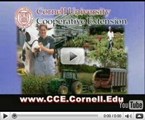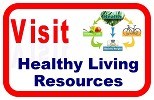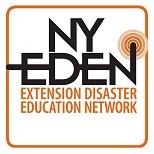Posted 10/5/2012

Date: Thursday, October 18Time: 6:30-8:00 p.m.Place: Shirley Luck Senior Center, 109 E. Main Street, Johnstown
According to the Academy of Nutrition and Dietetics (www.eatright.org) “There is no one diet for all people with diabetes. There is, however, a ‘recipe’ for eating healthfully that is similar to recommendations for heart health, cancer prevention and weight management.”
On Thursday, October 18, 2012, Cornell Cooperative Extension in Fulton and Montgomery Counties will present “Dining with Diabetes” at the Shirley Luck Senior Center, 109 E. Main Street, in Johnstown from 6:30 – 8:00 p.m.
This workshop-style program is designed to help those with diabetes and their family members learn how to eat well with diabetes. The class will include meal planning basics, quick meal and snack ideas, how to include sweets, and tips on meals out.
Dining with Diabetes will be taught by trained Nutrition Program Educator Jean Budlong. Refreshments and healthy snacks will be demonstrated and available for tasting. Participants will receive a free diabetes cookbook.
There is no charge for the program, which is grant funded. Space is limited and pre-registration is required. To register, contact Cornell Cooperative Extension in Fulton and Montgomery Counties at 518-673-5525. Families and/or caretakers are welcome to attend.
Posted 10/3/2012
by Shannon Dygert

Celebrate local food and agriculture during Farm to You Fest 2012! From October 1 to October 7 schools and communities throughout New York State will be celebrating local agriculture during what was officially known as New York Harvest for New York Kids Week.
During the weeklong promotion, school food service directors, teachers, principals, parents, nutritionists, 4-H clubs, librarians, farmers and others are encouraged to organize fun and educational activities for students in pre-school, elementary, high school and even college. Many schools will celebrate local, healthy foods by featuring New York farm products on their school lunch menus. Other examples of celebrations include: classes having a farmer as a guest speaker, students taking a field trip to a local farm or farmers' market, recipe contest and community health fairs.
The Department of Agriculture and Markets' Farm to School Program will be supplying participating schools and organizations with an assortment of promotional and educational materials. A limited supply of materials include: the very popular fruit and vegetable "Trading Cards", harvest charts indicating times when fresh produce is available and "Fascinating Food and Farming Facts" brochures that stimulate "food for thought" for all ages. Those who would like to order supplies should fill out the order form, available on the Department's Farm to School website at http://www.agriculture.ny.gov/f2s/news.html.
This year's Farm to You Fest will be officially celebrated from October 1 through October 7;however, harvest events can and will occur throughout October.
Posted 9/19/2012
With the beginning of a new school year in full swing, it is important to check that your pre-teens' and teens' immuniations are up-to-date. Although most vaccines are delivered during early childhood, several immunizations are recommended for adolescents. At the age of 11 or 12, all adolescents should receive three important vaccines and an annual flu vaccine.
Adolescents may need to catch-up on vaccines missed when they were younger or receive boosters. To learn more about vaccines recommended for adolescents, check out the easy to use chart at Vaccines.gov, which lists the immunizations recommended by the Advisory Committee on Imunization Practices (ACIP) for children and youth ages 7-18. The U.S. Precentive Services Task Force and all major medical groups adopt the ACIP recommendations.
Posted 9/13/2012
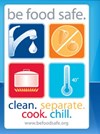
Food handling safety risks at home are more common than most people think. These four easy steps can help prevent harmful bacteria from making your family sick.
CLEAN Bacteria can spread throughout the kitchen and get on hands, cutting boards, knives, and countertops. Frequent cleaning can keep that from happening. And always wash hands with warm water and soap for 20 seconds before and after handling food.
Rinse fruits and vegetables under running tap water just before eating. Rub firm-skin produce (or scrub with clean brush) under running tap water.
COOK Even for experienced cooks, the improper heating and preparation of food means bacteria can survive. Use a food thermometer — you can't tell food is cooked safely by how it looks.
SEPARATE Cross-contamination is how bacteria spreads. Keep raw meat, poultry, and seafood and their juices away from ready-to-eat foods.
CHILL Bacteria spreads fastest at temperatures between 40°F and 140°F, so chilling food properly (keep a constant refrigerator temperature of 40°F or below) is one of the most effective ways to reduce the risk of foodborne illness.
A message from "Be Food Safe", a joint program of the USDA and The Partnership for Food Safety Education.
Posted 9/6/2012
New York State Ag & Markets notice:
Eastern Equine Encephalitis (EEE) was detected in necropsy samples from an eight to ten year old Warmblood gelding today. The horse has been in Westchester County, NY, and Massachusetts for the last few weeks. The horse’s vaccination history in regard to EEE is not known. On 8-24-12, the Warmblood had acute onset of ataxia and increased digital pulses. The farm’s veterinarian examined the animal and initiated medical treatment and had to return within an hour, because the horse had dramatically deteriorated. The horse was severely ataxic, febrile, leaning and eventually went down. Since the vet and trainer noticed such a rapid, dramatic decline in the horse’s condition they elected to humanely euthanize the same day. There are other horses on the same premises but none are showing signs of illness and have since received a booster EWT vaccine. A necropsy was performed at the NYS Veterinary Diagnostic Laboratory and the brain was submitted to NYSDOH’s Wadsworth Center on 8/27/2012 for both Rabies and Arboviral testing. Rabies and West Nile Virus tests are negative.
Posted 8/30/2012
There are a surprising number of people in our area who own a sizable amount of wooded property and come to discover this land needs care and attention, as any other real estate would. Understanding your particular woodlot, discerning what kind of care it needs and the marketing opportunities it presents is all part of the science of silviculture.
The course is designed for novice to intermediate woodland owners and anyone interested in learning about and discussing sustainable woodland practices.
You should dress for the weather and be prepared for walking on moderately rough ground. You should also bring a hard hat, clipboard, and pencil.
Cost is $15 per person; Pre-registration and payment is required by Sept. 28, 2012. Registration is limited to the first 30 people.
Focus will be on safety, silviculture, and technique, how to inspect equipment and tools for wear, utilizing safe practices in woodlot management, understanding basic silvicultural principles, make appropriate tree selection for choices such as sugaring and lumber, observe directional felling using a felling plan and the use of an ATV and arch for moving saw logs and firewood, and protective gear necessary for safe chainsaw operation.
Download full brochure below.
To register and for directions call 845-344-1234 or email cah94@cornell.edu
Posted 8/16/2012
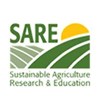
The following story is from SARE, Sustainable Agriculture Research & Education, whose mission is to advance—to the whole of American agriculture—innovations that improve profitability, stewardship and quality of life by investing in groundbreaking research and education.
Karl Kupers saw improved water-use efficiency on his 4,400-acre eastern Washington grain farm when he replaced a wheat/fallow system with expanded crop rotations and no-till seeding.
In western Colorado, crop farmer Randy Hines developed a tillage tool that leaves vegetative residue on the soil while creating irrigation furrows in every other 30-inch row. He saved water by using half the typical number of irrigation furrows and saved money through fewer tractor trips across his fields.
Illinois farmer Ralph "Junior" Upton broke up a 6- to 8-inch layer of compacted clay by planting cover crops after soybean and corn harvests, thereby enhancing his soil's ability to store water for upcoming crops.
With drought conditions gripping more than half the United States this summer, water-saving strategies are more critical than ever for America's farmers and ranchers. That is why SARE's 16-page bulletin, Smart Water Use on Your Farm or Ranch, is an excellent primer on conservation-oriented approaches to water use. Check out http://www.sare.org/Newsroom/Press-Releases.
Smart Water Use on Your Farm or Ranch spotlights innovative, SARE-funded research into a range of conservation options including soil management, such as using compost, conservation tillage and cover crops; plant management, featuring crop rotation, water-conserving plants and rangeland drought mitigation; and water management strategies such as low-volume irrigation and water recycling.
Posted 8/9/2012
Since July 2011 eight states have experienced documented cases of a novel flu strain. In total there have been 29 cases of human infection with H3N2v virus. 23 of these cases reported swine contact prior to onset of their illness –of these 23 cases, 19 were associated with fairs where swine were present. Of note, 16 of the 29 cases were confirmed between July 12 and August 1 of this year. According to the Center for Disease Control, more cases of human infection with H3N2v virus are anticipated, occurring either from exposure to infected swine or through subsequent, limited human-to-human transmission.
The CDC has the following information available now, and will continue to update this information as it learns more about these outbreaks:
Web posting: http://www.cdc.gov/media/index.html
H3N2v landing page: http://www.cdc.gov/flu/swineflu/influenza-variant-viruses-h3n2v.htm
Fact sheet: http://www.cdc.gov/flu/swineflu/h3n2v-factsheet.htm
Information for People Attending Fairs
- Thousands of fairs take place across the United States each year. Swine exhibits are common at these fairs.
- Of the H3N2v cases reported since July 2012 to date, 15 of 16 have been associated with attendance at fairs where swine were present. In some cases, patients reported direct contact with swine, in other cases they did not.
- CDC would like to let people know about some preventative actions they can take to make their fair experience a safe and healthy one.
- The National Association of State Public Health Veterinarians has developed the ”Compendium of Measures to Prevent Disease Associated with Animals in Public Settings, 2011, available online at http://nasphv.org/documentsCompendiumAnimals.html, to provide some preventive actions that are applicable to people raising animals, showing animals at fairs, or attending fairs including swine.
- Take Action to Prevent the Spread of Flu Viruses Between People and Pigs
- Wash your hands frequently with soap and running water before and after exposure to animals.
- Never eat, drink or put things in your mouth while in animal areas and don’t take food or drink into animal areas.
- Children younger than 5 years, people 65 years and older, pregnant women, and people with certain chronic medical conditions (like asthma, diabetes, heart disease, weakened immune systems, and neurological or neurodevelopmental conditions) are at high risk from serious complications if they get influenza. These people should consider avoiding exposure to pigs and swine barns this summer, especially if sick pigs have been identified.
- If you have animals – including swine – watch them for signs of illness and call a veterinarian if you suspect they might be sick.
- Avoid close contact with animals that look or act ill, when possible.
- Avoid contact with pigs if you are experiencing flu-like symptoms.
- If you must come in contact with pigs while you are sick, or if you must come in contact with pigs known or suspected to be infected, or their environment, you should use appropriate protective measures (for example, wear protective clothing, gloves, masks that cover your mouth and nose, and other personal protective equipment) and practice good respiratory and hand hygiene.
Source: Lisa A. Lauxman, Ph.D., Director, 4-H National Headquarters, Division of Youth & 4-H Institute of Youth, Family & Community, NIFA, USDA
Posted 7/31/2012

The Fulton and Montgomery County Public Health Departments, in conjunction with the NYS Police, will conduct a Child's Car Seat Safety Check on August 9, 10:00 a.m. - 1:00 p.m. at the Perth Volunteer Fire Station, 4080 State Highway 30, Amsterdam.
Come and have your child’s safety seat checked for proper fit, installation, recalls and receive education from state certified technicians. This program is funded by a grant from The New York State Governors Traffic Safety Committee.
Posted 7/30/2012

Child development and parent educators say that news coverage of events like the mass shooting at a movie theatre in Colorado can frighten children and trigger fears about their own safety. Here are some ways teachers, parents and other caregivers can support children in dealing with traumatic events in the news.
The Children, Youth & Families Education & Research editorial board offers these solutions:
- Acknowledge the frightening parts of the event.
- Reduce or limit exposure to television images and news coverage.
- Let children air their feelings.
- Be creative.
For an explanation of these points and reference contact information, click below.


